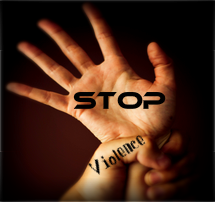Examples of abuse include:
- Name-calling or putdowns
- Keeping a partner from contacting family or friends
- Withholding money
- Stopping a partner from getting or keeping a job
- Actual or threatened physical harm
- Sexual assault
- Stalking
- Intimidation
The violence takes many forms and can happen all the time or once in a while. An important step to help yourself or someone you know in preventing or stopping violence is recognizing the warning signs.
Who is Affected?
Although both men and women can be abused, most victims are women. Children in homes where there is domestic violence are more likely to be abused and/or neglected. Most children in these homes know about the violence. Even if a child is not physically harmed, they may have emotional and behavior problems.
What are the effects of domestic violence or abuse?
The adverse effects of domestic violence or abuse can be long-lasting. People who have been abused by a spouse or intimate partner often suffer from:
- Depression
- Anxiety attacks
- Low self-esteem
- Lack of trust in others
- Feelings of abandonment
- Anger
- Sensitivity to rejection
- Chronic health problems
- Sleeping problems
- Inability to work
- Poor relationships
- Substance abuse
In addition to these problems, physical abuse may result in serious injury or death if the victim does not leave the relationship.
What is the effect of domestic violence on children?
Children who witness domestic violence may develop serious emotional, behavioral, developmental, or academic problems. As children, they may become violent themselves, or withdraw. Some act out at home or school; others try to be the perfect child. Children from violent homes may become depressed and have low self-esteem.
As they develop, children and teens who grow up with domestic violence in the household are more likely to:
- Exhibit violent and aggressive behavior.
- Attempt suicide.
- Use and abuse drugs.
- Commit crimes, especially sexual assault.
- Become abusers in their own relationships later in life.
Signs & Symptoms
Early warning signs that your partner may become abusive:
- Extreme jealousy
- Controlling behavior
- Quick involvement
- Unpredictable mood swings
- Alcohol and drug use
- Explosive anger
- Isolates you from friends and family
- Uses force during an argument
- Shows hypersensitivity
- Believes in rigid sex roles
- Blames others for his problems or feelings
- Cruel to animals or children
- Verbally abusive
- Abused former partners
- Threatens violence
Has your partner ever:
- Had a bad and unpredictable temper?
- Hurt you, or threatened to hurt or kill you?
- Threatened to take your children away, especially if you try to leave?
- Threatened to commit suicide, especially as a way of keeping you from leaving?
- Forced you to have sex when you didn’t want to?
- Destroyed your belongings or household objects?
Do you :
- Fear your partner a large percentage of the time?
- Avoid certain topics out of fear of angering your partner?
- Feel that you can’t do anything right for your partner?
- Ever think you deserve to be physically hurt or mistreated?
- Sometimes wonder if you are the one who is crazy?
- Feel afraid that your partner may try to hurt or kill you?
- Feel afraid that your partner will try to take your children away?
- Feel emotionally numb or helpless?
- Think that domestic violence seems normal to you?
What are the causes of domestic abuse or domestic violence?
Violence is usually not an isolated incident but a pattern of behaviors intended to harm and control. You are NOT responsible for, nor do you deserve, any abuse you receive no matter what.
An individual who was abused as a child or exposed to domestic violence in the household while growing up is at an increased risk of becoming either an abuser or the abused in his or her adult relationships. In this way, domestic violence and abuse is transmitted from one generation to the next. This cycle of domestic violence is difficult to break because parents have presented abuse as the norm.
Other factors that can lead to domestic abuse include:
- Stress
- Economic hardship
- Depression
- Jealousy
- Mental illness
- Substance abuse
Screening & Diagnosis
Although the best way to solve problems that arise in the home is through communication, many times women don’t dare to speak with their partners. They are afraid to be screamed at, humiliated, or that their partner may become
violent and hurt them. And because of this, it will be very important to arrive for an initial evaluation by yourself, and without your partner. During this one hour you will be screened for domestic violence and other co-occurring mental health condition. This information will be shared and a plan of action will be discussed with you for treatment.
Treatment
It has been difficult to craft programs that successfully help abusers or potential abusers stop the cycle of domestic violence. There has been greater success in developing programs that criminalize domestic violence or offer shelter and support to victims of domestic abuse. Initial treatment programs for abusers focused on anger management, but research indicates that anger management is not the problem. Most abusers can control their anger toward other people or in public. But they feel justified in aiming their anger toward their intimate partner at home. Thus, the current focus is on changing the abuser’s attitude toward women.
Education
Education is key in preventing domestic abuse. Key issues include raising awareness about domestic violence, letting people know that domestic violence is a crime and that it will be punished, and educating victims about their rights and how to get help.
Coping Skills
If you are being abused, REMEMBER
- You are not alone
- It is not your fault
- Help is available
Victims of domestic violence often do not seek help because they are afraid of retaliation from their partner.
You can create your own safety plan ahead of time for when you need to get away fast.
How can a woman safely leave an abusive relationship and protect herself from further abuse? Most women cannot simply leave their homes, their jobs, their children’s schools, their friends, and their relatives to escape their abuser. They depend upon police to enforce the law against physical abuse. Yet, police cannot act until a restraining order is violated or until some physical harm again befalls the woman.
If you are a victim of domestic violence, you may believe that it’s easier to stay with your abuser than to try to leave and risk retaliation. However, there are many things you can do to protect yourself while getting out of an abusive situation, and there are people waiting to help.
There are many places that offer 24-hour support, emergency shelters, legal services, and information about safe options for you and your children. For more information and assistance, please call:
National Domestic
Violence Hotline
1-800-799-7233
1-800-787-3224 TTY
If you are experiencing current incidents of abuse, you deserve to receive support from people who understand the reality of physical and sexual violence.
Abuse is never a onetime event.
Prepare a safety plan. Before another violent act takes place, make plans so you are sure where you are going and how you will get there in case of emergency. Do not tell your partner what you are planning.
http://www.womenslaw.org/safety.htm

